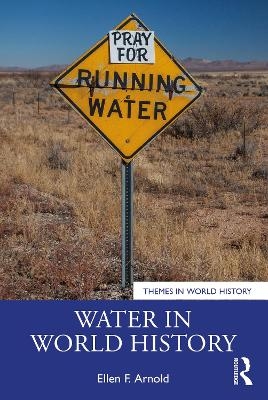
Water in World History
Seiten
2024
Routledge (Verlag)
978-0-367-65005-6 (ISBN)
Routledge (Verlag)
978-0-367-65005-6 (ISBN)
This book takes a thematic approach to the global history of water, covering a wide range of human interactions with water and the ways in which it carries both life and death.
Water is one of the most common and valuable natural resources for the survival of individual people and civilizations. As the Anthropocene brings the unpredictable challenges of climate change, population growth, and global industrialization and urbanism, issues of water scarcity and availability will be ever-growing, and both the presence and absence of water can be sources of far-reaching disaster. The book argues that a deeper understanding of water’s history is essential for navigating these changes. The chapters discuss water and religion, floods and disasters, water engineering and waterpower, the history of drinking water, water parks and leisure, the history of underwater exploration, and the history of drought and water scarcity. Each chapter is global in scope and is told over a broad chronology, with complementary case studies.
Water in World History is an accessible introduction to water history and is an ideal resource for undergraduate students in environmental history and world history courses.
Water is one of the most common and valuable natural resources for the survival of individual people and civilizations. As the Anthropocene brings the unpredictable challenges of climate change, population growth, and global industrialization and urbanism, issues of water scarcity and availability will be ever-growing, and both the presence and absence of water can be sources of far-reaching disaster. The book argues that a deeper understanding of water’s history is essential for navigating these changes. The chapters discuss water and religion, floods and disasters, water engineering and waterpower, the history of drinking water, water parks and leisure, the history of underwater exploration, and the history of drought and water scarcity. Each chapter is global in scope and is told over a broad chronology, with complementary case studies.
Water in World History is an accessible introduction to water history and is an ideal resource for undergraduate students in environmental history and world history courses.
Ellen F. Arnold is a medieval environmental historian with a focus on religion and water and is a Senior Lecturer of History at The Ohio State University, USA. She is the author of Medieval Riverscapes (2024) and Negotiating the Landscape (2012), and the co-editor of the journal Water History.
1. Water and Religion 2. Dangerous Waters 3. Who Will Build It? 4. Waterworks 5. Drinking Water 6. Water Parks 7. Underwater Encounters 8. Water Scarcity
| Erscheinungsdatum | 12.09.2024 |
|---|---|
| Reihe/Serie | Themes in World History |
| Verlagsort | London |
| Sprache | englisch |
| Maße | 152 x 229 mm |
| Gewicht | 349 g |
| Themenwelt | Geisteswissenschaften ► Geschichte ► Allgemeine Geschichte |
| Geschichte ► Teilgebiete der Geschichte ► Kulturgeschichte | |
| Weitere Fachgebiete ► Land- / Forstwirtschaft / Fischerei | |
| ISBN-10 | 0-367-65005-3 / 0367650053 |
| ISBN-13 | 978-0-367-65005-6 / 9780367650056 |
| Zustand | Neuware |
| Informationen gemäß Produktsicherheitsverordnung (GPSR) | |
| Haben Sie eine Frage zum Produkt? |
Mehr entdecken
aus dem Bereich
aus dem Bereich
der stille Abschied vom bäuerlichen Leben in Deutschland
Buch | Hardcover (2023)
C.H.Beck (Verlag)
23,00 €
vom Mittelalter bis zur Gegenwart
Buch | Softcover (2024)
C.H.Beck (Verlag)
12,00 €


